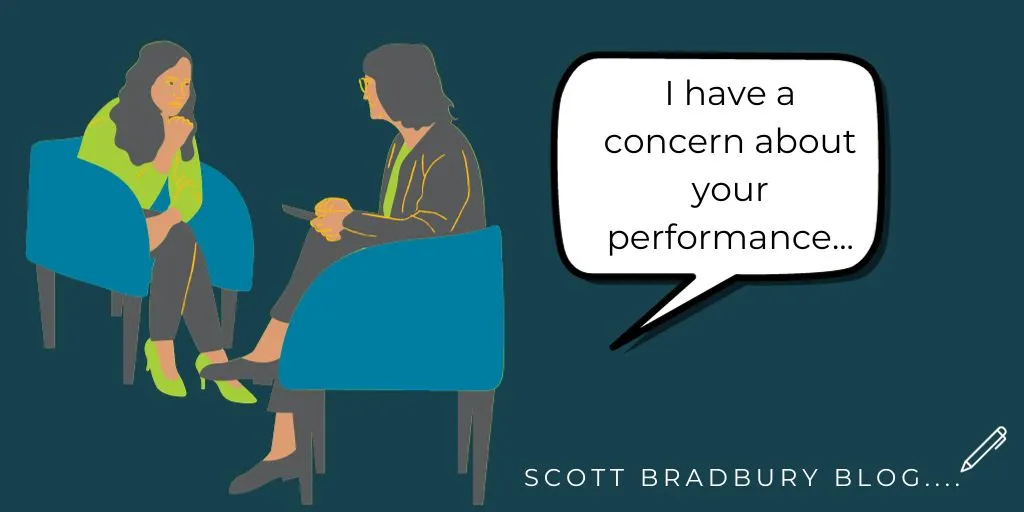
Performance Conversations
Things change. What was once regarded as the dreaded ‘annual appraisal’ morphed into the more regular and informal, performance review, but now it’s rebranded again into what many organisations call ‘performance conversations’. I’m not usually a great fan of this kind of terminology tinkering, but this is different. Words do matter and ‘performance conversations’ suggest a big step forward, and an improvement in the way we discuss, review and support our people’s development and performance at work. So I’m a fan of ‘performance conversations’.
We participate in conversations, and that’s the key to this. It’s a dialogue, with contributions coming from both people involved in the meeting. It’s setting time aside to specifically talk about someone’s work, achievements, aspirations and development (although there are good reasons to hold a separate ‘development’ meeting). A performance conversation also means addressing calmly and objectively any concerns that either (or both) people have about the work that is being done.
To work effectively, a conversation about someone’s performance needs preparation and openness on both sides of the dialogue. It’s not just sitting down with someone and having a chat over a cup of coffee, pleasant though that may be. And when a manager has concerns about someone’s behaviour or performance, it’s important to address those concerns clearly and fairly. But that’s not easy to do well, and many managers do it badly or not at all. They prevaricate, are vague in their criticism, or gloss over things due to a lack of confidence. Likewise, the individual concerned needs to feel able to raise their own concerns about their role in the organisation, without fear of being penalised.
One of the most difficult barriers people face is how to get started. And this is where learning and using practical phrases can be so helpful. They kickstart the conversation and enable you to move the conversation into areas you want to cover. So for example, when wanting to make someone aware that you are not entirely happy with a specific aspect of their performance, you can use the phrase, ‘what I was expecting to see was such-and-such a behaviour/result/approach, when what I am actually seeing is such-and-such different behaviour/result/approach’. This sets out clearly, and non-judgmentally an issue you want to explore. You explain how it appears to you, and then crucially, you need to ask the question, ‘How do you see it?’ so you invite the other person to share their perspective on the same issue. This is both enlightening and respectful and as long as each person listens carefully to what the other is saying, it provides a means to a resolution to the problem and an agreement about the way forward.
Asking questions and listening actively to the answers is crucial, as they are in all effective communication. And that’s essentially what performance conversations are about. Communication. The clear, respectful and objective exchange of perspectives, thoughts and ideas.
Having an understanding of how to receive feedback is enormously beneficial too. Even skilled managers sometimes express themselves clumsily, and without properly thinking about the impact of their words. But if the person on the receiving end knows how to control their knee-jerk reactions and use questions to clarify the comments, even crass, poorly delivered feedback can be turned into something useful.
Giving positive feedback and praise sounds like it should be easy. It’s the ‘nice’ flipside of having to express a concern about someone’s performance. However, just like giving negative feedback, giving praise requires skill too. Generic phrases like, ‘you’ve done well this month and you’re really well liked in the team’ are all very well but they don’t communicate specifics. It’s lazy. In giving effective praise you need to reinforce particular behaviour. So you need to be precise and timely in giving positive feedback, so the person knows exactly what you like and why. What exactly did they do which merits your praise?
All of this is easier said than done, of course. And that’s where short videos, podcasts and activities are so helpful in enabling people to prepare and practise the kind of conversations they need to hold. The Scott Bradbury WATCH & GO® library of performance support tools uses real people in its videos to illustrate phrases and human behaviour, so you can see how to ask questions, probe, listen, express performance concerns and give praise. They also show how to receive feedback and treat people fairly and respectfully. And our short interactive Skills Challenges quiz people on their current skills and understanding.
The words ‘Performance Conversations’ are a step in the right direction. But if people don’t know how to have an effective dialogue about someone’s work then they are just that: words. However, skilfully conducted, Performance Conversations have the power to improve, motivate and make a genuine difference to both your people’s and your organisation’s performance. We can help you achieve this.
Catherine de Salvo
1 November 2023
You can contact Catherine at catherine@scottbradbury.co.uk or via LinkedIn